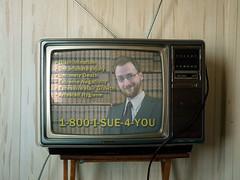
Green v. York Condominium Corporation No. 834 and ThyssenKrupp Elevator (Canada) Ltd. 2013 ONSC 5004 (CanLII)
Decision Date: July 29, 2013
http://canlii.ca/t/g01g5One evening in August 2005 Ms Green, a 72 year old resident of YCC 834, entered the elevator on the 16th floor intending to meet visitors in the lobby. The elevator descended and stopped but the door did not open. There had been very heavy rain for the past two days and, although Ms Green did not know it, many problems with the elevators. When the doors failed to open she banged on them for help, and then used the emergency telephone inside the elevator to call the condominium gatehouse. The person who answered said that he would send help. After “a long period of time” without assistance of any kind, the elevator door opened a small ways (described by Ms Green as “five or six inches” at her examination-for-discovery and one to one-and-a-half feet at trial) and she tried to exit the elevator sideways. As she did so the elevator moved again and propelled her out onto the lobby floor. She slid across the floor and hit a pillar, injuring her head and shoulder. Her visitors took her to the hospital where she was found to have a broken shoulder.
Ms Green made a separate agreement to settle her claim against YCC 834; the issue for this trial was whether ThyssenKrupp Elevator bore any liability for Ms Green’s injuries. Her counsel argued that the company had failed in its duty of care under the Occupier’s Liability Act. Justice O’Marra dismissed the claim based on the following reasons: 1) ThyssenKrupp is not an “occupier” under the Act but an independent contractor; 2) There was no evidence of negligence on their part, and no connections made between their actions and Ms Green’s injuries; and 3) Ms Green was “the author of her own misfortune” because she left a place of safety (i.e. the stuck elevator).
Comment: It is surprising to me that a stuck elevator would be considered a “place of safety.”
673830 Ontario Limited v. MTCC 673, 2013 ONSC 5218 (CanLII)
Decision Date: August 16, 2013
http://canlii.ca/t/g053bIn May 2011 at MTCC’s annual general meeting unit owners were told that the corporation would receive a payment from the City of Toronto because of an earlier expropriation of common elements land by the TTC, and that this payment would cover the cost of urgently needed roof repairs. In August the corporation received a payment of about $750,000. In September the applicant made an offer to purchase one of the building’s units, conditional upon receiving and approving the corporation’s Status Certificate. The Certificate stated that the Board anticipated that the reserve fund would be adequate in the current fiscal year for the expected cost of major repairs. In November the Board issued a special assessment to unit owners for $1,000,000 for the cost of roof repairs; this was cancelled when it was determined that the roof replacement cost could be lowered. In February 2012 the Board held a special meeting to explain that the payment from the TTC would cover the expected cost of roof repairs. Certain unit owners wished to be paid their share of the monies directly (rather than have them applied to the roof repairs) and so the Board issued a second Special Assessment in the exact amount of the TTC payment. (Whether a unit owner elected to have his share of the TTC payment applied directly to the roof repair, or to pay the assessment and then receive a share of the payment, there would be no net change to the owner’s finances.)
The Applicant demanded a share of the TTC payment. It argued that it was not informed in the Status Certificate, either about the pending roof repairs or about the anticipated payment from the TTC, and so should be exempt from both Special Assessments. The Board argued that the Applicant should not profit from the TTC payment without contributing to roof repairs, and that the second Special Assessment was issued for “administrative purposes” only. The Judge found that the Status Certificate was accurate when it said that the reserve fund would be adequate to cover the cost of anticipated repairs and that the Applicant had not been treated differently from other unit owners. The application was dismissed.
Comment: Sometimes a Special Assessment is not a Special Assessment.
 I'm very happy to have an article, "When Lawyers Trust Their Intuitions" in the current issue of Canadian Lawyer's e-magazine. Although the research I discuss was done with lawyers it is relevant to anyone who wants to make better decisions.
I'm very happy to have an article, "When Lawyers Trust Their Intuitions" in the current issue of Canadian Lawyer's e-magazine. Although the research I discuss was done with lawyers it is relevant to anyone who wants to make better decisions.
